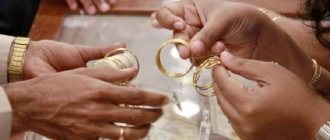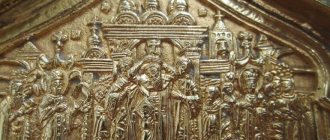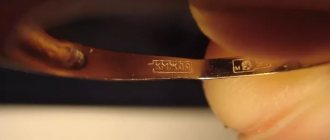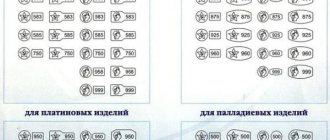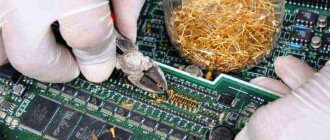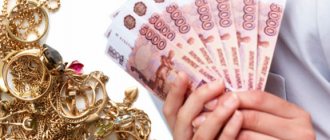A pawnshop in our time is a financial organization that provides a cash loan for a short period of time on the security of any property. In addition to this service, pawnshops can store valuables and provide consulting services.
Such organizations are not banking institutions, therefore they can accept the following as collateral:
- precious metals and products made from them;
- household appliances (computer equipment, mobile phones, televisions, video and audio equipment, etc.);
- motor transport;
- antiques;
- products made from natural fur.
Pawnshops differ from banks in their specific operating methods:
- The borrower is not required to provide proof of income (no one is interested in this).
- Money is issued regardless of the purpose of its use.
- The terms of a secured loan are quite flexible - from 1 month to 1 year.
- Completing the transaction takes a few minutes.
- The borrower has the right to redeem the mortgaged property at any time.
The acceptance procedure consists of assessing the value of the item that is being pawned at the pawnshop and concluding a transaction (the interest rate is determined - the loan, payment for storage and insurance services). After signing the contract, the borrower is given a certain amount of money (depending on how much the item was valued), a storage receipt and a personal deposit ticket. This type of document, such as a pawn ticket, is mandatory for Russian pawnshops. It refers to strict reporting forms (SSR), it must indicate the details of the financial organization, as well as the order number, circulation, printing house, and production date. If the borrower does not redeem the pledged item in due time, then it remains in the pawnshop, the owner of which can put it up for auction or sell it in some other way.
In modern Russia, there are several types of pawnshops, which differ in the types of collateral services provided:
- When accepting only jewelry, finished products made from precious metals are purchased at the price of scrap.
- Regarding the acceptance of household appliances, such property is valued upon acceptance at 30-50% lower than its actual value (this is explained by the fact that if the item is not redeemed from the pawnshop, it will have to be sold, and no one will most likely want to purchase it, which was used).
- When issuing short-term loans, profit comes from interest (although the borrower’s property is also taken as collateral).
- Mixed – includes the provision of several types of services.
Pawnshops, as financial organizations, cannot operate under a simplified taxation system. Therefore, accounting has a somewhat specific form: VAT is paid for the service of storing things, and interest received from the borrower is not subject to this tax.
Is it profitable to open a pawnshop in Russia?
The benefit from such a business depends on the type of financial organization that the pawnshop owner decides on. Accepting property as collateral often involves risks of unexpected losses. For example:
- Finding a good jeweler appraiser with extensive experience is quite difficult, and in addition, reagents and special equipment are needed to determine the quality of the metal;
- there is no certainty about the origin of the pledged item (it may have a criminal record, that is, stolen);
- incorrect customs clearance of vehicles;
- Storing electronic equipment (especially mobile phones) leads to a drop in its value due to the fact that the model becomes outdated and becomes unpopular.
It is believed that there is no benefit at all in buying clothes, since they quickly go out of fashion and may lose their marketable appearance while they are in storage.
Who buys gold?
When selling gold or gold-plated items, you need to follow simple rules and know who to sell to. >In banks you can get absolutely accurate indicators of the weight, uniqueness and price of a gold product. With competent legal support, the cost of a product acquires the most accurate estimate.
Sell gold
Jewelry stores and workshops sometimes offer not only to buy from themselves, but also buy gold items. In this case, a thorough assessment of the gold will also be carried out and a realistic price will be offered for it. In pawnshops the situation is completely different. Money there, as a rule, is issued on the day of application. In this case, the product assessment will be carried out as carefully as in a bank or jewelry store, with confirmation of the confidentiality of information. For many people this is quite attractive.
Selling to private buyers is an unreliable method. Some dishonest businessmen can easily deceive the seller when weighing, assessing the uniqueness and determining the cost of a product. Due to constant price fluctuations in the precious metals market, the price of gold can quickly change in favor of either the seller or the buyer. Private buyers have to be contacted in the case of raw or illegal gold, as well as after gold products are not accepted at a bank, pawnshop or jewelry workshop.
The purchase of products in the presence of gold in radio components, printed circuit boards or production waste is carried out by specialized companies. You can donate radio components in the region using advertisements from such companies on the Internet.
Step-by-step instructions: how to open a pawnshop
If you decide to start your financial business from scratch, we suggest you familiarize yourself with step-by-step recommendations on how to open a pawnshop on your own.
So:
- Study the pawn shop market in your city or region (now this type of business is very common, so two or three such organizations may already be operating in your area).
- Decide on the type of pawnshop and the types of services offered.
- Draw up a business plan and calculate all the possible risks of this financial enterprise (if you find it difficult to do this yourself, contact specialists who will help you make the necessary calculations).
- Select a location for your company's office:
- area (city center, business district, residential area, etc.);
- parking (preferably next to the office);
- separate entrance;
- status (rented or own premises).
- Complete the procedure for registering a pawnshop as a legal entity:
- familiarize yourself with the principles of taxation for LLCs and CJSCs;
- in the charter, specify all types of activities of your organization (short-term loans secured by movable property, storage services, consulting citizens);
- give the name of your organization (keep in mind that the word “pawnshop” itself must be present in it);
- draw up the appropriate documentation (protocol on the establishment of the company, its charter, articles of association, lease agreement for office space or purchase and sale agreement, registration statement);
- pay the state fee (2000 rubles);
- receive a registration certificate and a sanitary and epidemiological certificate, which is accompanied by a list of all services provided;
- Become, as a legal entity, registered with the Federal Service for Financial Monitoring and the State Inspectorate of Assay Supervision of the Assay Chamber.
- Start developing a logo for your financial company and decorating the premises (cosmetic renovations to make the appearance more presentable and create a cozy atmosphere).
- Purchase the necessary equipment:
- showcases and racks;
- armchairs or chairs for visitors;
- information stands;
- computer, MFP (printer), telephone;
- security system and security cameras;
- strong doors, windows and locks;
- scales, technical accessories for checking the quality of jewelry;
- office supplies (forms, pens, printer paper, etc.).
- Select personnel: an experienced appraiser, cashier, salesperson, accountant, manager, security guard.
- Prepare internal documentation for your pawnshop: cash register, instruction book, employment contracts, orders for setting interest rates and the cost of items accepted.
- Place your advertisement: sign, banner, promotional flyers, website.
- Install special software for accounting turnover and connect to the Internet.
Get to work.
How to legally formalize the purchase of jewelry from hand and in retail stores (individual entrepreneurs and LLCs)
The question of what organizational and legal form a legal entity should have, Article 48 of the Civil Code of the Russian Federation, does not play a fundamental role here. You can also register as an individual entrepreneur. There are many nuances in this activity. Read the following Rules for purchasing jewelry and other household products made of precious metals and precious stones and scrap of such products from citizens
For a more complete consultation, you need to contact a lawyer personally.
The main thing is to comply with the requirements of the Federal Law of March 26, 1998 N 41-FZ (as amended on August 2, 2019) “On Precious Metals and Precious Stones” (as amended and supplemented, entered into force from October 1, 2019)
To conduct business in buying jewelry, you will need a license under Article 15.1 of this law.
The procedure for purchasing jewelry from the population is determined by
Decree of the Government of the Russian Federation of June 7, 2001 N 444
“On approval of the Rules for the purchase from citizens of jewelry and other household products made of precious metals and precious stones and scrap of such products”
1. These Rules establish the procedure for purchasing by organizations, regardless of organizational and legal form, and individual entrepreneurs (hereinafter referred to as the buyer) from citizens (hereinafter referred to as the deliverer) in their ownership of jewelry and other household products made of precious metals and precious stones and scrap of such products .
2. Lost power.
See text of paragraph 2
3. The buyer must have the necessary premises, equipment, inventory and a security system for the premises, ensure, in accordance with established requirements, registration, accounting, storage of purchased valuables and the necessary conditions for servicing the deliverers, as well as comply with the mandatory requirements of state standards, environmental, sanitary and epidemiological, hygienic, fire safety and other rules and regulations.
4. To carry out operations for receiving and testing valuables, the buyer must have:
a) weighing and other relevant equipment, as well as the necessary tools;
b) reagents necessary to determine the name and sample of precious metals in products and scrap.
5. The purchasing organization must have experts with appropriate qualifications in matters of examination and assessment of values.
An individual entrepreneur-buyer must have the necessary qualifications in matters of examination and assessment of values.
6. The buyer is obliged to bring to the attention of the deliverer:
a) the corporate name (name) of your organization, its location and operating hours, an individual entrepreneur - information about state registration and the name of the body that registered it;
b) has become invalid;
See the text of subparagraph b of paragraph 6
c) information about documents establishing requirements for the marking of valuables, their acceptance and registration;
d) these Rules;
e) information about the bodies monitoring compliance with these Rules.
This information is placed in convenient places for reference.
7. Acceptance of valuables for purchase is carried out regardless of the presence of manufacturers’ birthday names and imprints of state hallmarks on them, and commemorative and anniversary (personalized) medals - upon presentation by the deliverer of the appropriate certificates for the right to own such medals.
8. Settlements with donors of valuables are made on a contractual basis.
9. Not subject to purchase:
a) rough diamonds and semi-finished products;
b) precious metals in native and refined form, as well as in raw materials, alloys, semi-finished products, industrial products, chemical compounds and industrial and consumer waste;
c) semi-finished products for jewelry and dental prosthetics (except for crowns and discs);
d) products for industrial and technical purposes made of gold, platinum, palladium and silver (plates, wire, contacts, laboratory glassware, etc.);
e) precious stones - rubies, sapphires, emeralds, alexandrites, as well as natural pearls in their raw form;
f) orders and medals, except commemorative and anniversary (nominal) ones, containing precious metals;
g) products containing precious metals and precious stones and withdrawn from civil circulation or limited in circulation (cold steel, firearms with decoration, etc.).
10. All operations related to the purchase of valuables (determining the names of precious metals and precious stones, determining the sample of precious metal, weighing, removing pins, etc.) must be carried out in the presence of the deliverer using methods that do not violate the integrity of the valuables.
11. Weighing of values is carried out with accuracy:
products made of gold, platinum and palladium - up to 0.01 grams;
silver products - up to 0.1 grams;
products made of precious stones without a frame - up to 0.01 carats.
The weight of precious stones that cannot be set from products when purchased or that are impractical to be set from products is determined by instruments with an accuracy of 0.1 carats.
The deliverer must be given the opportunity to verify the correctness of the determination of the mass of the valuables handed over to him. The buyer is responsible for the correct assessment of accepted values in accordance with the legislation of the Russian Federation.
12. If the deliverer agrees with the assessment of the accepted values, the buyer issues to the deliverer for payment of the amount due to him a receipt in 2 copies, signed by the buyer and the deliverer. After paying the amount due to the deliverer, he is given 1 copy of the receipt with the “paid” stamp.
13. The receipt shall indicate:
a) the name of the organization or the surname and initials of the individual entrepreneur - buyer;
b) the surname and initials of the deliverer, indicating the details of the document proving his identity;
c) the name of the product, parts of the product and their quantity, description of the birthday stamp (for pre-revolutionary products - the master’s birthday stamp) and the hallmark (for imported products - the import stamp stamp);
d) name of precious metals, fineness, weight, contract price per gram and cost;
e) name of precious stones, their quantity and weight, contract price per carat, cost, including in relation to:
large diamonds (from one carat and above), medium ones (from 0.30 to 0.99 carats), emeralds, sapphires, rubies, alexandrites - also their size and weight group, color and purity group;
rose cut diamonds, small diamonds (up to 0.29 carats) and simplified cut diamonds - also their color and clarity group;
natural and cultured pearls - the number of pearls and their weight;
f) total weight of the product;
g) the amount to be paid to the deliverer of valuables.
14. Accepted valuables cannot be returned after payment.
15. Monitoring of compliance with these Rules is carried out by federal executive authorities authorized in accordance with the legislation of the Russian Federation and their territorial bodies.
Article 2 of this law states: Precious metals and precious stones acquired in the manner established by the legislation of the Russian Federation may be in federal property, the property of constituent entities of the Russian Federation, municipal property, as well as in the property of legal entities and individuals. Owners of precious metals and precious stones exercise their right of ownership of precious metals and precious stones in accordance with this Federal Law, the Civil Code of the Russian Federation,
Article 15.1. Licensing of activities for processing (processing) scrap and waste of precious metals and activities for the purchase from individuals of jewelry and other products made of precious metals and precious stones, scrap of such products
(introduced by Federal Law dated 02.08.2019 N 282-FZ)
Activities for processing (processing) scrap and waste of precious metals and activities for the purchase from individuals of jewelry and other products made of precious metals and precious stones, scrap of such products are subject to licensing in accordance with the legislation of the Russian Federation on licensing of certain types of activities.
Call
Did the answer help you? Yes No
Business profitability
Experts warn: the return on investment takes about 1.2-2 years. After three years of operation, the pawnshop will begin to generate good income. The first six months are important in the formation of a business - finances have been invested in a young enterprise, but there is no “plus” profit yet.
In order for such a profit to appear, you should attract as many clients as possible, that is, ensure high daily traffic (at least up to 30 clients per day). For many newly founded pawnshops, this task is impossible, so a financial organization that does not generate income closes after 6 months of operation.
Attention! Within our portal, you can get advice from a corporate lawyer completely free of charge. All you need to do is leave your question in the form below:
Federal Law “On Pawnshops”
This is one of the main documents regulating the activities of such organizations. They determined that they have the right to provide short-term loans to citizens, as well as storage services for things intended for personal use. At the same time, pawnshops are prohibited from engaging in any other business activities. Those. in fact, this law clearly indicates that these establishments cannot directly engage in the purchase of gold.
Advantages in Moscow
1
accepts gold for further melting, so it can offer its customers the highest prices in Moscow. It is not the condition of the product that is assessed, but its weight and fineness. At the same time, the price of a gram of any gold standard increases and clients manage to get the maximum price.
2 Buying gold “Skupik.ru” does not set any restrictions on the volume of accepted products. Each client can sell any quantity, including miniature products, at a decent price.
3 When accepting products, an assessment is required. This procedure is free of charge. A large number of offices in Moscow, which is very convenient for all clients.
